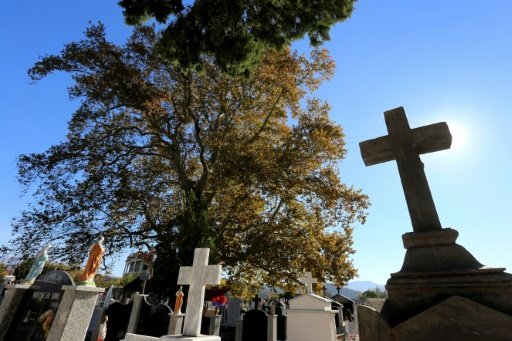
by Briseida Mema | The plane tree in the Rrmaj cemetery where it is believed that some of 38 martyrs of the catholic church have been executed during the communist regime on November 1, 2016 -AFP photo
SHKODRA, ALBANIA: They were tortured to death, fatally strung up by their feet, shot or thrown into quicksand.
Now, more than 30 years after their deaths, 38 Albanian Catholics killed under the isolated Communist regime of dictator Enver Hoxha are to be beatified — a step on the path to sainthood.
Vatican officials will join the Balkan country’s small Catholic community on Saturday to remember their martyrs at a cathedral mass in the northwestern city of Shkodra, whose cemetery was the scene of executions.
“Faith in Christ was our only glimmer of hope in the life of Communist hell,” said Father Ernest Simoni, who spent nearly two decades doing forced labour in prison and in the fields.
The 88-year-old clergyman will on November 19 become only the second Albanian to become a cardinal.
Initially condemned to death for celebrating a mass in memory of slain US president John F. Kennedy, he instead was forced to toil and eventually escaped the brutal repression during prisoner unrest in 1973.
Two-thirds of his sentence was spent in pyrite mines in the deserted Albanian mountains, more than 100 kilometres (60 miles) north of Tirana.
– ‘A land of martyrs’ –
The bodies of hundreds who went missing still lie in the underground passages around the notorious Spac labour camp.
Few Albanians at the time knew about the prison complex — except that people who went there rarely returned.
“It brings to mind Dante’s Circles of Hell, a gulag built for opponents of the Communist regime,” historian Gjergj Marku told AFP.
If there was a Marxist motto that dictator Hoxha liked to repeat, it was that religion is the “opium of the people” and he tried to eradicate it from his country, officially declaring it an atheist state in 1967.
He engaged youth organisations to destroy 1,280 churches and mosques, which were sometimes transformed into sports or entertainment halls.
Seven bishops, 111 priests, 10 seminarists and eight nuns died in detention or were executed between 1945 and 1985, accused of having hidden arms to overthrow the regime, or of being spies or traitors.
“Albania was a land of martyrs,” Pope Francis told a crowd of up to 300,000 when he visited Tirana in 2014.
– ‘How is it possible?’ –
In the Shkodra cathedral museum, 82-year-old priest Gjergj Simoni — imprisoned for 10 years for writing a “Letter to Lucifer” meant for Hoxha — recently told the story of the 38 believers who will be beatified.
There was Marie Tuci, a young woman tortured to death, and priest Pjeter Cuni, who did not survive being hung up by his feet.
Another priest, Leke Sirdani, was thrown alive into a cesspool, while Josif Papamihaili was swallowed by a quicksand swamp in eastern Albania.
Two German priests are among the martyrs and one Italian, Giovanni Faustini, who was shot aged 47.
“How is it possible that a man could invent such tortures to humiliate people who refused to surrender and never betrayed their faith?” wondered Angelo Massafra, the archbishop of Shkodra.
More than 30 years after the death of Hoxha in 1985, the dictator’s dream of an atheist country has disappeared.
According to the national institute of statistics, 56.7 percent of Albania’s three million people identify as Muslims, while more than 10 percent are Catholic and almost seven percent Orthodox.
Fewer than 14 percent refuse to answer the question of their religion.
Drane Malaj, 71, wiped her eyes as she recalled her uncle, a priest whose remains were found four decades after he was shot in Shkodra, and who will be beatified this weekend.
“He has a grave and will be recognised as a martyr in the name of God,” she said.
by Briseida Mema -AFP
